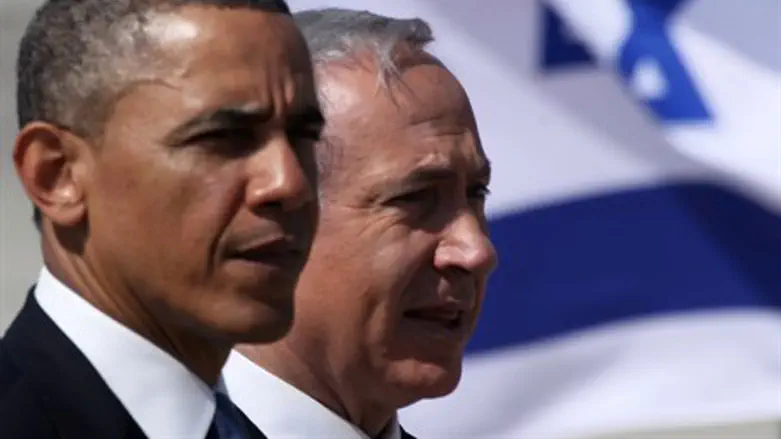
The current diplomatic crisis between Israel and US President Barack Obama's administration is the most vicious and public yet among only a handful of crises that have marred the close, long-running relationship, says an expert on relations between the two nations.
Obama's frosty relationship with Prime Minister Binyamin Netanyahu hit new lows this month, with the White House criticizing remarks Netanyahu made on election day, in which he said a Palestinian state would not be founded if he was elected - which he quickly backtracked on, and warned foreign funded NGOs were busing Arab Israelis to vote en masse - which he apologized for.
The White House threatened in response to the issue of a Palestinian state that it may pull support for Israel at the UN, allowing such a state to be recognized. It likewise rejected Netanyahu's apology on the Arab voter issue; Netanyahu's warning noted that groups like V15 were busing in the voters to oust him, and the Senate has in fact launched a probe into Obama's alleged funding of the V15 campaign.
Yet another repercussion of the growing fallout - which started in earnest early this month when Netanyahu warned Congress about the Iran nuclear deal being formed despite Obama's opposition - was seen when the White House accused Israel of spying on the Iran talks; on Monday it bluntly said Israel's "occupation of Palestinian land" must end.
The bad blood between Obama and Netanyahu is "unprecedented," Israeli historian Jonathan Rynhold told AFP.
"The public nature of the mutual hostility is a new low. I don't think we've ever had as bad a relationship between a president and a prime minister, and of course that has policy consequences," he said.
Pulling military aid
Israeli and American relations have seen tension since the beginning of the state, as the US did not provide any military aid in Israel's first two wars for survival in 1948 and 1957, instead urging David Ben-Gurion not to declare the establishment of the renascent Jewish state.
One of the most significant crises in diplomatic ties was seen in 1975, when Washington pressed Israel to withdraw from the Sinai Peninsula, which it had seized from attacking Egyptian forces during the 1967 Six Day War. The region was assessed to contain enough fuel resources to ensure all of Israel's economic needs by itself.
Israel refused to do so without a full peace deal with Egypt, prompting US president Gerald Ford to inform Prime Minister Yitzhak Rabin that Washington would conduct a "reassessment" of bilateral ties.
US arms shipments to Israel were halted during that reassessment - a significant step given that the US had become Israel's biggest provider of financial and military aid.
Israel eventually agreed to withdraw from Sinai, an agreement it formalized in a 1979 peace treaty with Egypt, after which US aid resumed.
Obama showed a similar willingness to pull military support during the war against Hamas terrorists in Gaza last summer; in the middle of the fighting, Obama blocked a routine shipment of Hellfire missiles and ordered future weapons transfers to be more stringently supervised.
Pollard and phone numbers
Another schism was formed in 1985, when the US arrested American intelligence analyst Jonathan Pollard, who passed classified US information on regional threats to Israel on to the Jewish state.
The incident caused a "major low" in the relationship, Rynhold said, and has since been a regular source of tension. Washington sentenced Pollard to life in prison, in what recently declassified documents indicate was a sentencing on false charges.
The unprecedented harsh punishment is not in keeping with spies for other allied countries - or even of enemy countries. In February an Iranian American spy was caught passing sensitive military information to Iran, and was anticipated to receive a mere five years.
Israel has pushed for Pollard's release - he currently is 60-years-old having spent half his life in a US jail, and suffers from a failing health condition. Despite this, Obama has refused to use his clemency powers to pardon Pollard, and just last July he was refused parole in a hearing.
Rynhold detailed another key clash between the US and Israel back in 1990.
In a shaky start to cooperation between George H W Bush's administration and Israeli premier Yitzhak Shamir, the US secretary of state very publicly rebuked Israel over conditions it was requiring in peace talks.
Bush's secretary of state James Baker directed the following remarks to Shamir at a meeting with the House Foreign Affairs Committee: "I have to tell you that everybody over there should know that the telephone number is 1-202-456-1414...when you're serious about peace, call us.''
And then on March 3 of this year, Netanyahu addressed Congress two weeks before Knesset elections at the invitation of Republican House of Representatives speaker John Boehner.
Boehner said he did not ask for permission from the White House, rather informing it of the invitation later, out of fear that Obama's administration would interfere.
Obama and dozens of Democrats boycotted the speech, in which Netanyahu warned that the deal being formed with Iran ahead of a March 31 deadline threatens to leave it with nuclear breakout capabilities, by which it would be able to quickly churn out a nuclear arsenal at the time of its choosing and lead to a regional nuclear arms race.